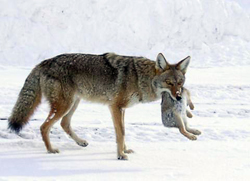State Parks Declares "War on Cats"
By James Hufnagel
 |
| Coyotes can be a threat to humans as well as pets. |
Although the eastern species of coyote has been implicated in numerous attacks on pets, livestock and at least one person in Niagara County, a bizarre and ill-advised recent educational message by the New York State Office of Parks and Recreation appears to be attempting to persuade local residents to live in harmony and even admire the dangerous nocturnal predator.
"This adaptable omnivore can be found in a variety of habitats" relates State Parks on its Facebook page, "and can either be seen alone or in packs up to six. Their eerie howls and yelps can be heard up to 3 miles away, and a few coyotes can make a lot of noise when they want to - giving the impression they are in huge packs."
Accompanied by a photo of what appears to be a well-groomed coyote loping through pleasant greenery, rather than the thin, skulking, mange-ridden and sometimes rabid animals that in reality they usually are, the post continues: "They are organized as a 'family unit.' Each family unit is made up of the adult pair and their pups from the current year... A coyote's diet changes with the seasons, consisting of whatever is easy and abundant... Have you ever heard a coyote? Take a listen."
Nowhere in the post is a threat to pets, livestock or humans mentioned, a warning to keep your distance, what you should do if you encounter a coyote, or how to safeguard pets.
According to a March, 2009 article in the Niagara Gazette, "A North Tonawanda man reported that he was bitten by a coyote on Sweeney Street around 1 a.m. Tuesday. 'He was just walking down the street,' North Tonawanda Fire Department Assistant Chief Joseph Sikora said, 'He told us the coyote came out, circled him a couple of times and nipped him in the leg.'"
People have been killed by coyotes. In one account, Taylor Mitchell, a young woman from Toronto on vacation in the Canadian Maritimes, died after being attacked by two coyotes in Cape Breton Highlands National Park.
Such disconnect on the part of New York State Parks with respect to our relationship to coyotes is entirely consistent with the agency's general approach to nature, which to put it mildly, is borderline schizophrenic. The bulldozing and paving over of Three Sisters Islands and Prospect Point in the Niagara Falls State Park, alleging that Glynn's boat crane painted blue "blends in" with the Niagara River, building a fenced-off "climbing wall" on the Niagara Gorge at the Discovery Center (gorge wall, climbing wall, get it?), calling the Moses Parkway "Olmsted-inspired", State Parks just doesn't get it.
Another state agency, the NYS Department of Environmental Conservation, at least devotes significant space at its web site warning of the dangers of coyotes, albeit in such simple third grade reading-level language it's hard not to laugh while reading it.
"Some coyotes in suburbia have lost their fear of people. This can result in a dangerous situation. A coyote who does not fear people should be considered dangerous. Coyotes in residential areas quickly learn to associate food with people. Suburban coyote food (garbage, pet food, pets) is saturated with human odor. Human behavior has changed to be non-threatening to coyotes (running into your home after seeing a coyote is behaving like prey). In short, food smells like people and people behave like prey."
"Do coyotes kill cats? Absolutely... To protect your cat, keep it indoors, or allow it outside only under supervision. Coyotes in some areas appear to become "specialists" at catching and killing cats. Do dog owners need to be concerned about coyotes? The answer is maybe."
Our tax dollars at work.
"It comes down to a territorial dispute between your dog and the coyote. Both believe that your yard is their territory... The dog and coyote usually come to an understanding on whose territory is whose. Owners of small dogs have cause for concern. The outcome of a confrontation between a small dog and a coyote will depend a lot upon the behavior of the dog. A coyote knows it is physically superior to a small dog and expects the dog to be submissive. Trouble occurs when a small dog does not submit to a coyote. The coyote will discipline the dog to correct its inappropriate behavior. This discipline will continue until the dog submits or is eventually killed."
The SUNY College of Environmental Science and Forestry spells it out in stark terms: "Coyotes relish cats as food items."
We are left to wonder how State Parks managed to remove the dozens of feral cats that inhabited Goat Island as recently as a few years ago. Did it involve the introduction of coyotes to Niagara Falls State Park? We wouldn't be surprised.